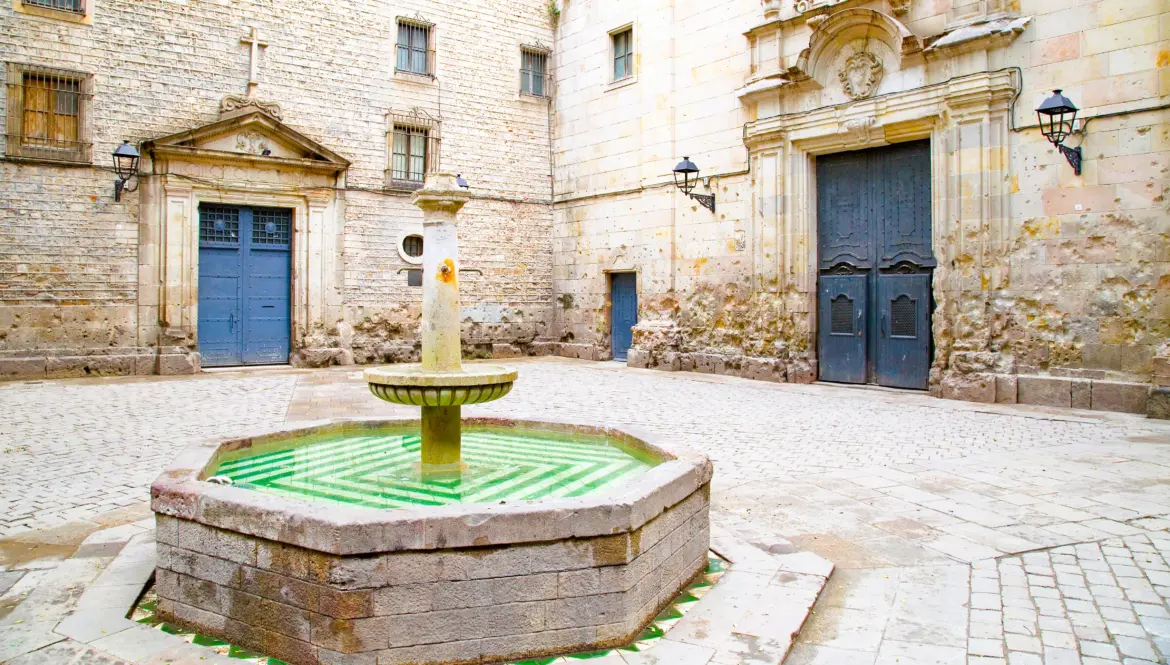Hola, dear readers! In the heart of Barcelona’s Gothic Quarter, where narrow alleys twist and echo with footsteps, you’ll find a small square that feels like a secret whispered only to those who take the time to wander. Plaça de Sant Felip Neri is not grand, flashy, or crowded like nearby La Rambla or Plaça Reial. Instead, it is hushed, intimate, and deeply moving, a place where history lingers in the stones and silence seems to tell its own story.
Stepping out from the tight passageways into the square is like breathing out after holding your breath. A fountain gently trickles at the center, tall plane trees offer shade, and the façades around you bear scars that immediately stop you in your tracks. It’s a space of contrasts – tranquil yet tragic, hidden yet unforgettable.
A Hidden Baroque Gem
The square takes its name from the Church of Sant Felip Neri, an 18th-century baroque jewel tucked against one side of the plaza. Its simple façade, with niches holding saints and weathered stone softened by time, feels worlds apart from the soaring Gothic spires of the nearby Cathedral. Inside, the atmosphere is warm and contemplative, with a single nave, small chapels, and an intimacy that invites reflection rather than grandeur.
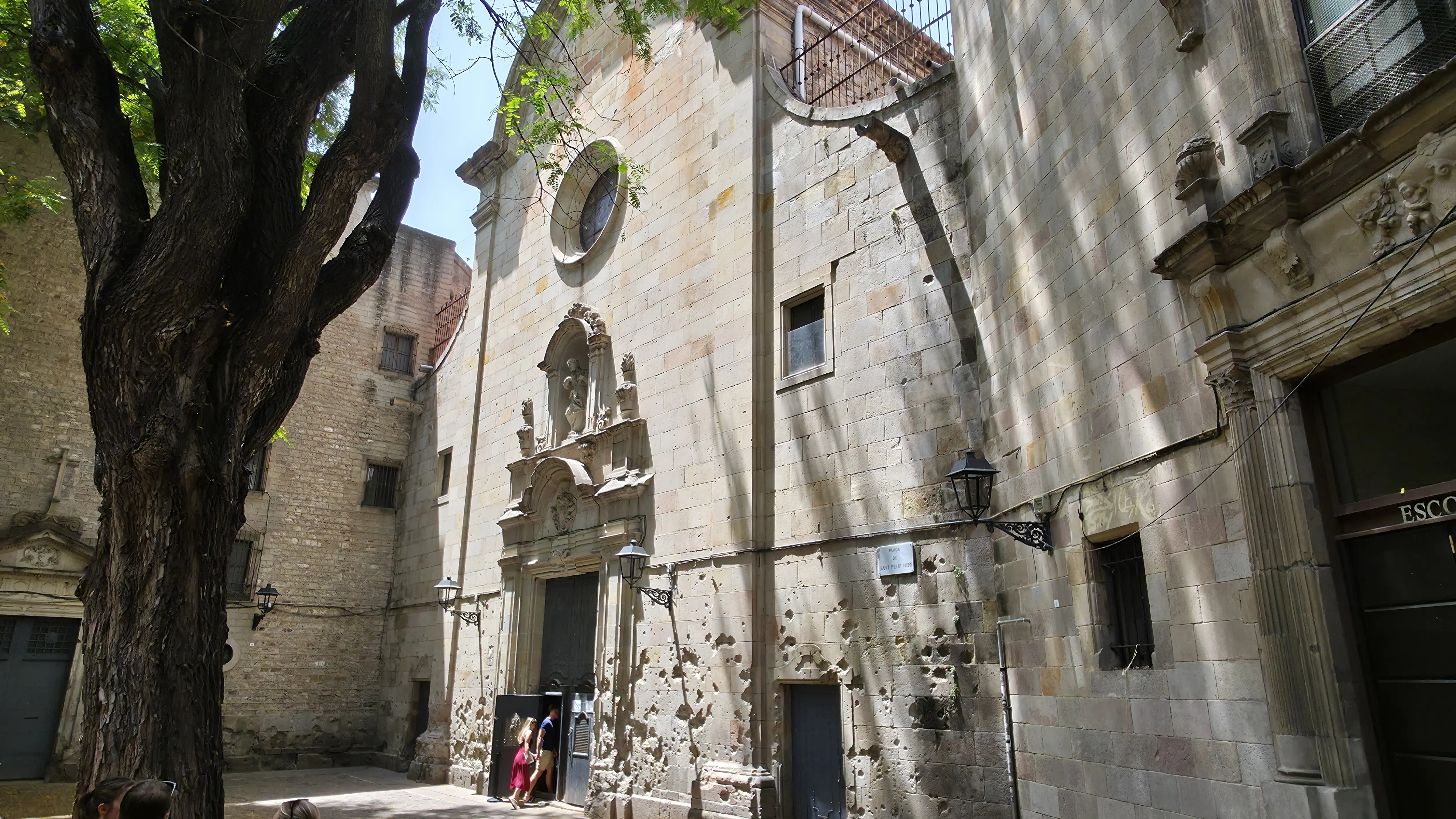
The square itself was designed to frame the church, giving it space to breathe in a dense neighborhood of twisting alleys. Its stone arcades and enclosed feel make it almost like a courtyard, a place of calm set against the noise of the city. It’s easy to see why locals and visitors alike pause here, not just to admire the church, but to step into a slower rhythm of life.
Traces of War
The most haunting part of Plaça de Sant Felip Neri is not what was built, but what was destroyed. In January 1938, during the Spanish Civil War, the square was bombed by Franco’s forces. Dozens of people lost their lives, many of them children who had sought shelter in the church basement. The scars remain today. Look closely at the church’s façade and the surrounding walls, and you’ll see the jagged marks of shrapnel and impact. They were never repaired, left instead as a living memorial to those who died and to the suffering Barcelona endured during those years.
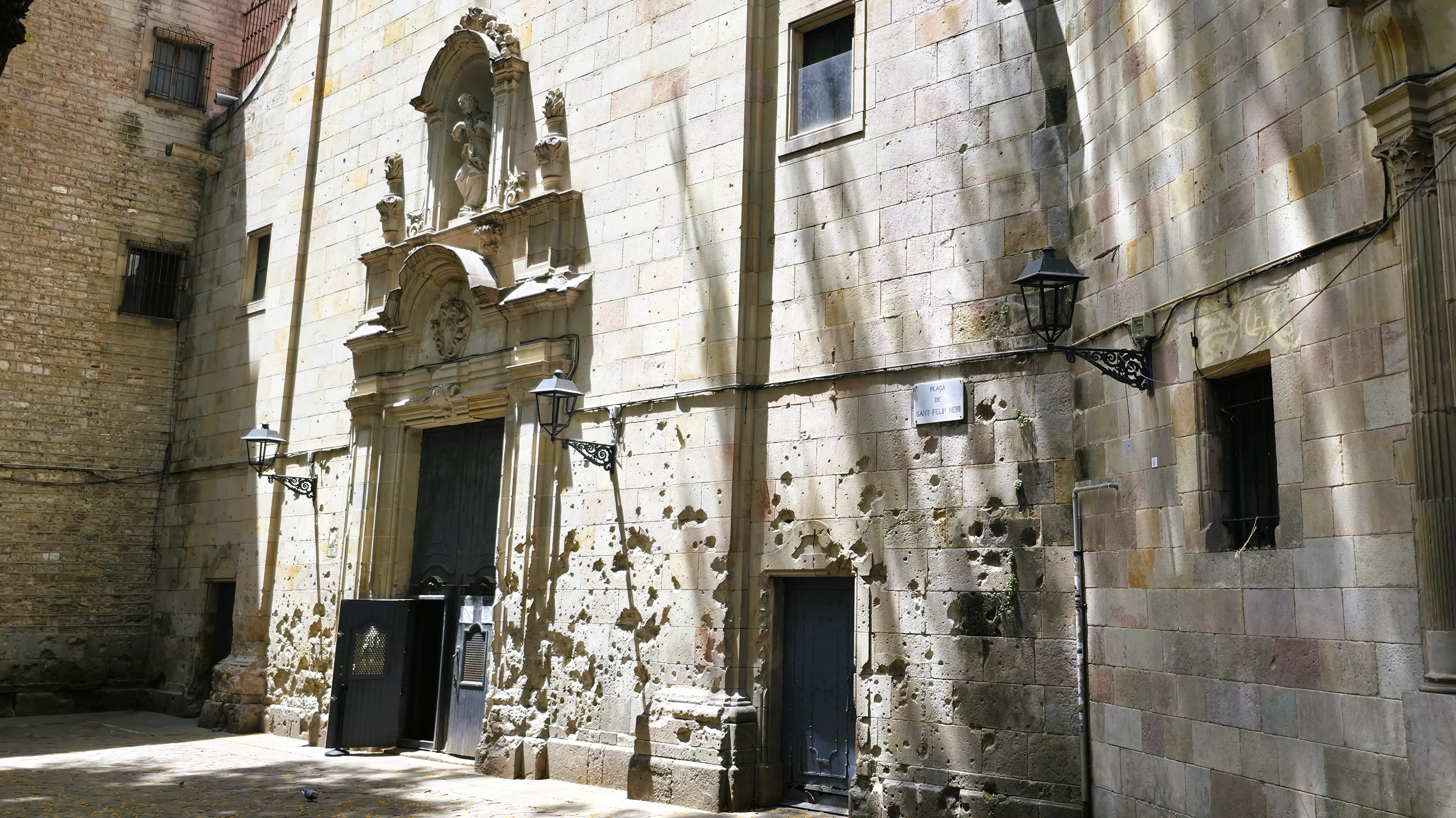
Standing there, you realize these are not just stones, they are witnesses. They hold the memory of a city torn apart, yet unbroken.
Everyday Life Today
Despite its somber history, Plaça de Sant Felip Neri is very much alive. The square centers around a stone fountain, where water flows gently into a circular basin. Children often chase each other across the cobblestones or perch on the fountain’s edge, while parents and neighbors rest on the benches beneath the trees.
Musicians sometimes wander through, their guitar notes mixing with the sound of water, while tour groups pause briefly before the square returns to its natural quiet. The shade of the trees, the warm light reflecting off the stone, and the murmur of the fountain combine to create an atmosphere that is peaceful yet reflective.
It’s a reminder that even places marked by tragedy can become spaces of everyday joy.
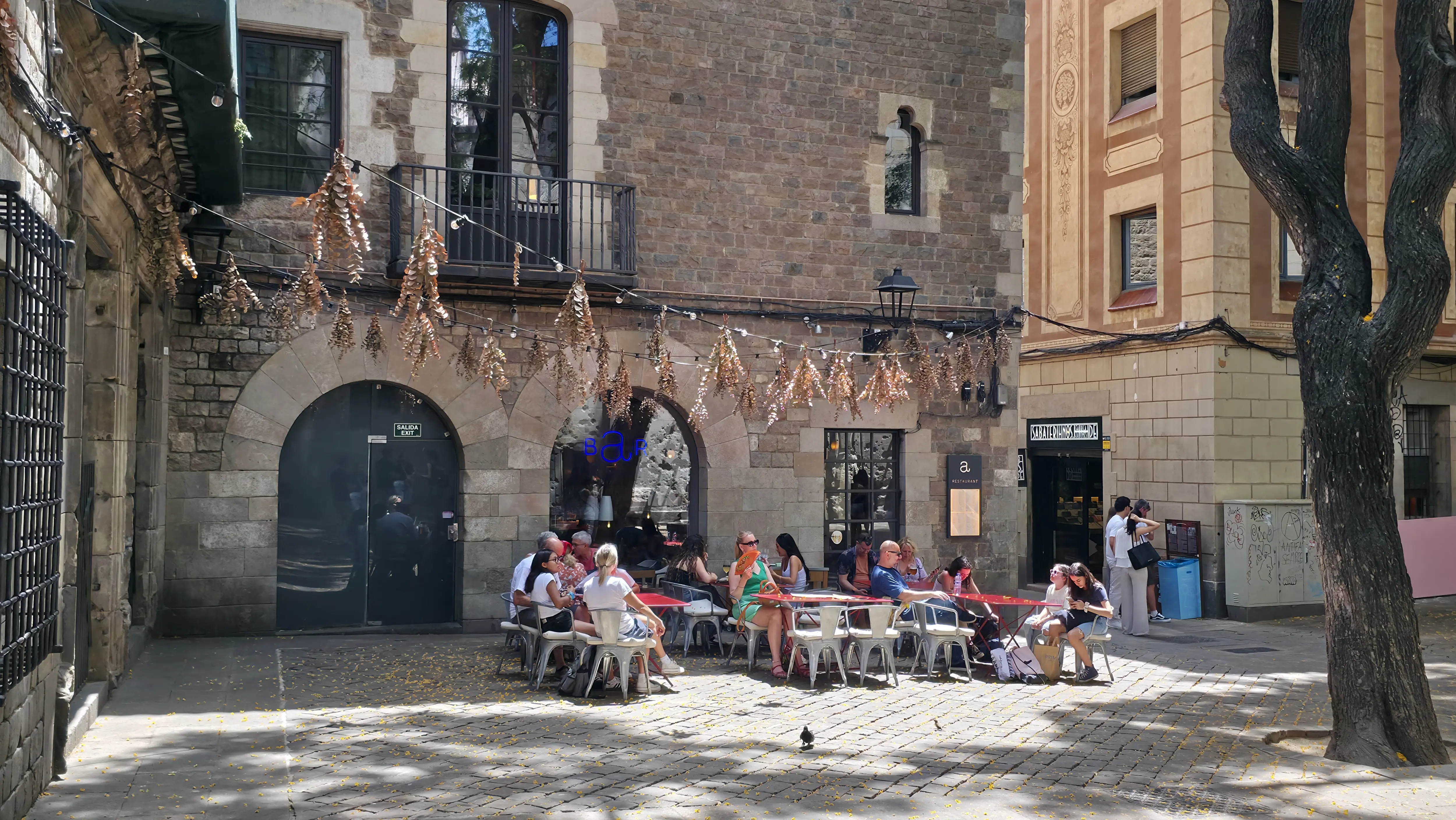
Through My Eyes
When I first entered Plaça de Sant Felip Neri, I felt as though I had stumbled into a place that wanted to be both remembered and rediscovered. I ran my fingers over the pockmarked stone of the church, each dent a trace of something violent, each scar a silent story. Then, just a few steps away, I saw children laughing and playing by the fountain. Their voices rang through the square, echoing off the walls like a declaration: life continues, joy persists. That contrast – sorrow written in stone and laughter floating in the air – moved me deeply.
For me, this square embodies Barcelona’s resilience. It is a place that carries its past with honesty but also embraces the present with grace. Standing there, I felt as though Plaça de Sant Felip Neri was quietly teaching me that beauty and pain, memory and life, can coexist.
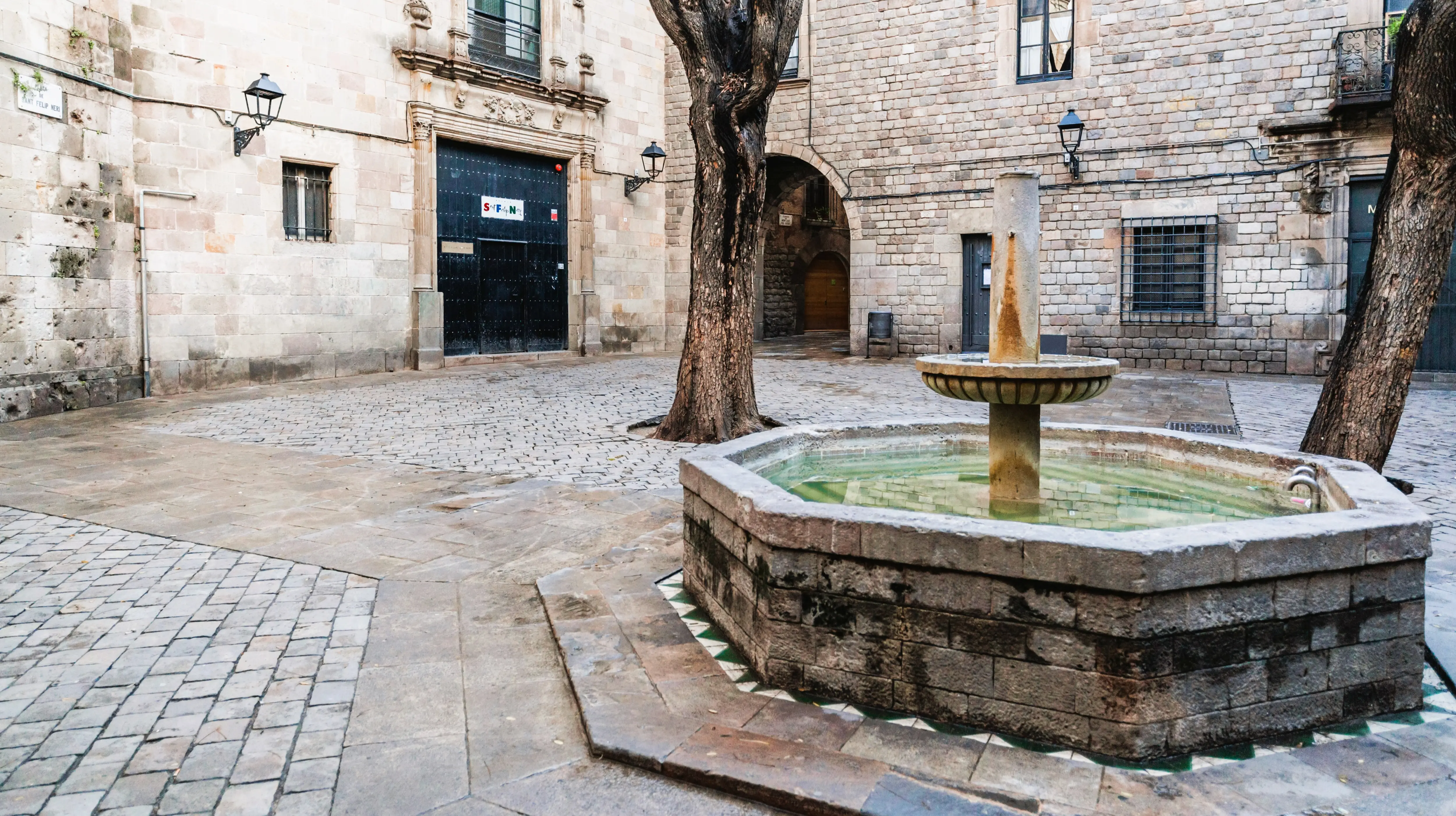
Tips for Visiting
- How to Find It: Hidden just behind the Barcelona Cathedral, down narrow alleys off Carrer del Bisbe or Carrer de Sant Sever. Part of the charm is how tucked away it feels.
- Best Time to Visit: Early morning for quiet reflection, or late afternoon when the light softens the stone and the square feels more intimate.
- What to Notice: The bombing scars on the church façade, the trickling fountain, the shade of the plane trees. Pause long enough to feel the atmosphere shift around you.
- Nearby Sights: Combine your visit with the Cathedral of Barcelona, Plaça Nova, and the surrounding labyrinth of Gothic Quarter streets.
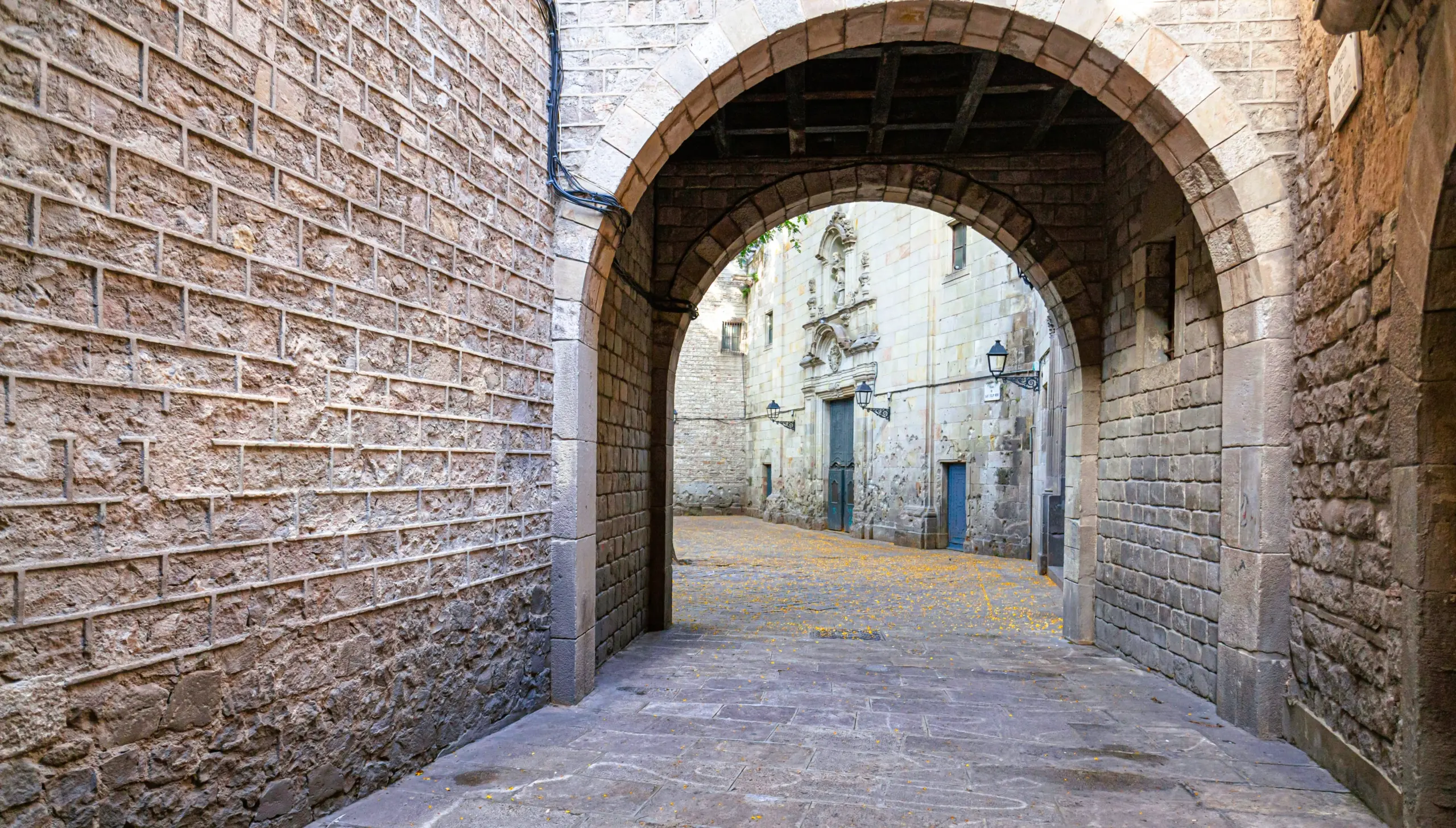
Final Thoughts
Plaça de Sant Felip Neri is not a postcard Barcelona square. It doesn’t dazzle with grandeur or sparkle with nightlife. Instead, it whispers. It invites you to slow down, to listen, and to feel.
Sitting on a bench, the fountain behind me and the scarred walls before me, I realized that this was one of the most powerful places I had visited in Barcelona. Not because it was perfect, but because it was honest, a square that holds both its beauty and its wounds and still offers peace to anyone who enters.
So when you find yourself in the Gothic Quarter, don’t just follow the crowds. Seek out Plaça de Sant Felip Neri, sit for a moment, and let its quiet story unfold.
xoxo,
Bubbly 🎈
🌟 Everything You Need to Plan Your Dream Trip in 2026
- 🌟 Luxury Hotels - Find premium stays with Booking.com & Hotels.com
- 🏡 Vacation Rentals - Discover unique properties on VRBO
- 🏞️ Guided Tours - Explore with Viator or GetYourGuide
- 🎫 Attraction Tickets - Skip the lines with Tiqets
- 🚢 Ocean Cruises - Set sail with Cruise Direct
- 📱 International SIMs - Stay connected with Saily
- 🚗 Car Rentals - Budget-friendly options from Discover Cars
- 🌐 Secure VPNs - Browse safely with NordVPN
- 💶 Currency Exchange - Best rates with Wise
- 🗣️ Learn Languages - Master the local language with Babbel and Rosetta Stone

